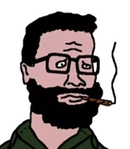Last night I saw a post calling freedom of speech a liberal idea, and that as communists we should not believe in it. Overall it got mixed responses, and personally I thought it was a little reductionist :very-smart:. But that's besides the point. Earlier that same night, I had been thinking about how freedom of speech and censorship exists in the United States. Seeing that original post prompted me to write this down, and here we are.
Freedom of speech is enshrined in the first amendment of the US bill of rights. However, this freedom is and has never been absolute. You've probably heard the stereotype of not being able to yell "FIRE" in a crowded theatre, or not being able to say direct threats of violence :pit:. These exceptions are meant to protect people from dangerous speech. However, there are also mechanisms that exist to protect the State from dangerous speech, the speech that we would all like to say openly with our chests :sicko-yes:. This isn't just in the US either, it applies to all countries to some degree.
So why do American's specifically believe that freedom of speech is a uniquely absolute thing in America? Why do people wrongly believe that even if the material conditions are becoming worse here, at least we live in a country that guarantees our opinions? This is because while censorship exists in the US, it is often obfuscated from the State, so people do not make the connection. I've thought of three levels of censorship in the US, 3 societal mechanisms that allow the State to obfuscate censorship from itself, and I would like to share them. Think of this as one of those iceberg charts that goes from surface level to borderline conspiracy :pepe-silvia:.
In the first level, there is private censorship. Like everything else in the US, even the authority to censor opinion has been privatized. This is something I'm sure all of us are familiar with, given our history with R*ddit. Private companies like Facebook, Twitter, and Reddit are freely and openly allowed to censor whoever they want, and sometimes, if necessary, they have people tell them special opinions of the state of what can and can't be said :fedposting:. Even when these companies don't listen to the state and work independently, they are still biased towards capitalist interests, and will privately censor leftist opinions. To the average American, this infringing of free speech is perfectly acceptable because these are private companies, and therefore perfectly falls in line with their liberal ideology :brainworms:. Unless of course they love our big wet orange boy :tromp:.
In the second level, there is something I like to call the "Screaming to the Wind" effect. Basically, it's when you're allowed to speak about something, but your voice is so minimized that no real action will come from it. "What freedom of speech does a homeless man have?" I say as I try to remember that one Stalin quote :stalin-approval:. In the same vein, you can have as many Trot newspapers as you could possibly read, but that still won't change the fact that FOX News :live-tucker-reaction: is the most popular news source in the country. In this level of censorship, you don't have to directly censor enemies of the state, you just have to dominate the space so that they get no traction. If traditional censorship removes your mouth :gamer-gulag:, this level removes everyone else's ears.
The third level, which I'm sure you've all been waiting for, is traditional, direct, state censorship. This level doesn't happen as much anymore because of the first two level, but when its needed the State pulls out the heart attack gun :gun-hubris: and gets to work. Let's say, hypothetically :shapiro-gavel: , someone is able to get around the first two levels. They work around private censorship, and build enough of an audience that they're no longer screaming to the wind. If the State believes them to be a legitimate threat, they will be censored in some shape or form. Their organization could be infiltrated and neutered :cpusa:, they could be sent to prison for bogus charges :debs:, or they could just be straight up assassinated :fred-hampton:. Often, it is all three, and many more I didn't bother mentioning. This level is the most direct form of censorship, and in order to maintain its image, the State must use extensive propaganda to limit blowback when it uses it :1984:. Luckily, it has the previous two levels of the censorship iceberg to invent reality and minimize public dissent. And then a week later, everyone will have forgotten, and we move on to the next story.
So, does freedom of speech exist in the United States? I'd say no, or rather, at least not to the degree that its meaningful. Freedom of speech isn't just something that lets you share cute doggos :swole-doge: and complain about your b*tch ex-wife. It's something that allows you to voice dissent to the State, with the ultimate expressed goal of the overthrow of the regime. If this change is never allowed to come, just how free was your speech in the first place? Of course, if this is true, then does freedom of speech really exist anywhere?
That's the end of my little spiel, hope you liked it. This wasn't based on any specific theory, so all of this is probably already in a book written by someone smarter than me, but thanks for reading my forum post instead of actual theory. People like it when they can make clean, concise universal models of things, and I'm no exception, but reality's a lot messier than political scientists want it to be, so there's probably something somewhere I forgot about. If you've got anything to add, feel free to share.


This is explicitly anti-free speech, and only one of the problems with the concept. Defending free speech is inevitably just defending "the marketplace of ideas", because it's the exact same thing.